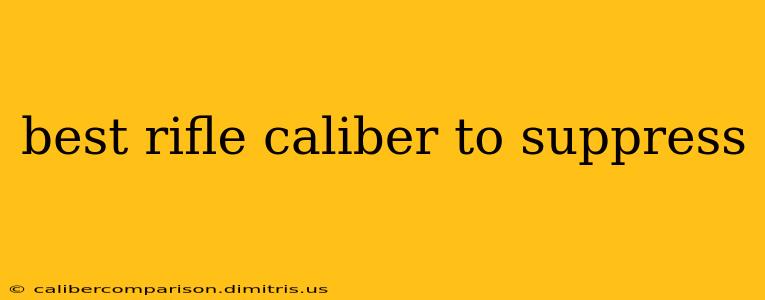Choosing the best rifle caliber for suppressed shooting involves a careful consideration of several factors. It's not simply about picking the quietest round; rather, it's about balancing sound reduction with performance, recoil management, ammunition availability, and your intended use. This guide will explore various calibers, highlighting their strengths and weaknesses in suppressed applications.
Understanding Suppressed Shooting
Before diving into specific calibers, let's clarify what makes a caliber suitable for suppression. The goal is to reduce the sound signature of a gunshot, primarily achieved by expanding and cooling the expanding gases produced by the cartridge. Subsonic ammunition plays a crucial role; supersonic rounds generate a loud sonic boom regardless of the suppressor.
Key Factors Influencing Suppressor Effectiveness:
- Caliber: Larger calibers generally produce more gas and noise.
- Ammunition: Subsonic ammo is essential for minimizing sound. Supersonic rounds will always be louder.
- Suppressor Design: A high-quality suppressor is crucial for optimal sound reduction.
- Firearm: The firearm's design and barrel length can influence how effectively a suppressor works.
Top Contenders for Suppressed Shooting
Several calibers stand out for their suitability for suppressed use. Let's examine some popular choices:
1. .22 Long Rifle (.22LR):
- Pros: Extremely quiet with subsonic ammunition, readily available, inexpensive ammo, low recoil.
- Cons: Limited stopping power, unsuitable for large game hunting or self-defense.
The .22LR reigns supreme for sheer quietness, making it ideal for training, pest control, and plinking. With subsonic ammo and a quality suppressor, it's incredibly discreet.
2. .300 Blackout:
- Pros: Designed for suppressed use, offers subsonic and supersonic options, decent stopping power, manageable recoil.
- Cons: Can be more expensive than other calibers.
The .300 Blackout is a purpose-built cartridge for suppressed applications. Its versatility, allowing both subsonic and supersonic rounds, makes it a popular choice for a variety of scenarios, from home defense to hunting.
3. 7.62x39mm:
- Pros: Widely available, affordable, good stopping power, manageable recoil with a suppressor.
- Cons: Can be louder than other options, particularly with supersonic rounds.
While readily available and relatively affordable, the 7.62x39mm isn't inherently designed for suppression. However, using subsonic ammunition and a quality suppressor can yield acceptable noise reduction.
4. .223 Remington / 5.56 NATO:
- Pros: Widely available, versatile, relatively inexpensive ammunition.
- Cons: Requires subsonic ammunition for quiet operation, can be louder than other dedicated suppressed calibers.
Similar to the 7.62x39mm, the .223/5.56 NATO benefits from the availability of subsonic ammunition, though it's not as inherently quiet as the .300 Blackout or .22LR.
Factors to Consider When Choosing a Caliber
Beyond the caliber itself, several other factors influence the effectiveness of suppression:
- Ammunition Selection: Always choose subsonic ammunition specifically designed for suppressed use. Supersonic rounds will defeat the purpose of your suppressor.
- Suppressor Quality: A well-designed, high-quality suppressor will significantly impact noise reduction.
- Barrel Length: Barrel length can affect the gases' expansion within the suppressor. Consult with a suppressor expert for optimal barrel length recommendations.
Conclusion: No Single "Best" Caliber
There's no universally "best" rifle caliber for suppressed shooting. The optimal choice depends entirely on your needs and priorities. Consider your intended use, budget, and the balance between sound reduction, performance, and ammunition availability when making your decision. Consult with experienced shooters and professionals to make an informed choice that best suits your individual requirements.

